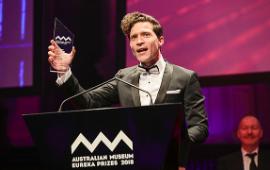Swinburne’s Alan Duffy wins Eureka Prize for promoting science

In Summary
- Associate Professor Alan Duffy wins Celestino Eureka Prize for Promoting Understanding of Science
- He is recognised for his commitment to informing, enthusing and engaging the public
Swinburne Associate Professor Alan Duffy has been recognised for his contribution to science communication with a Eureka Prize.
He has been awarded the Celestino Eureka Prize for Promoting Understanding of Science.
The award is given to a scientist who has shared their expertise with a broad audience - informing, enthusing and engaging the public.
Associate Professor Duffy says it is critical for Australia’s future that science is promoted and explained.
“Australia is facing many challenges that require more science not less, which is why it’s so critical to promote and explain science to ensure an informed electorate can make the right choices for our future,” he says.
“It’s a great honour to be recognised for helping to inform the public, but I can only do this thanks to the ongoing support of Swinburne and the Royal Institution of Australia.
“I’m proud of these two organisations, as well as the award sponsor Celestino, for their drive in promoting science nationally and beyond.”
This week in space on @BreakfastNews its waterworlds (yes Kevin Costner was right!), aboriginal astronomy and water on the moon https://t.co/PDkXyTqI5d
— Alan Duffy (@astroduff) August 27, 2018
To date, Associate Professor Duffy has made more than 100 appearances on popular television shows, explaining everything from gravitational waves and ice ages to the distant Universe. He is also the Lead Scientist of the Royal Institution of Australia, home of Australia’s Science Channel.
Mind = blown.
— News Breakfast (@BreakfastNews) February 27, 2018
It took some serious trickery with the studio cameras, but @astroduff explains what parallax is and how it proves the universe is expanding even more rapidly than we thought pic.twitter.com/xp3TSeRvJg
His research uses supercomputers as a virtual laboratory, watching as galaxies like our own Milky Way form from basic ingredients like atoms, using simple ‘recipes’ (or laws) like gravity.
Deputy Vice-Chancellor (Research and Development) Professor Aleksandar Subic congratulated Associate Professor Duffy on his win and praised him on the work he does to promote science.
“Alan has done wonderful work in promoting and reinforcing the excellence and impact of science. I am proud to see a Swinburne academic recognised for his outstanding contributions on the national stage.”

